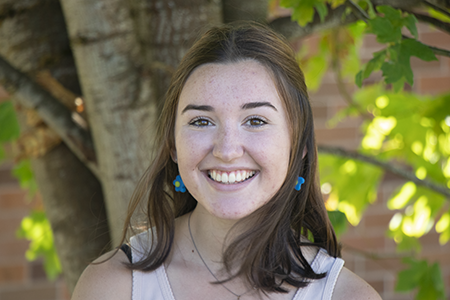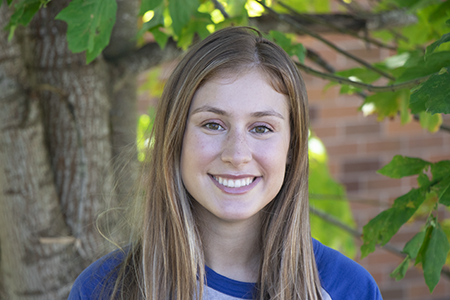Fall Immersion Experiences Go Virtual This Year, Continuing the Trend of A Digital World
“I still think that there will definitely be a lesson, a change of heart,” Ms. Maher said, “[and] an opportunity for La Salle kids to grow in faith and understanding of people who are facing hard times.”
October 14, 2020
The excitement that arises as students wake up early with tired eyes, piling onto buses, and heading off to become immersed in a one-of-a-kind experience is momentous. For a lot of students, attending immersions is something new and challenging.
Learning how to become vulnerable, surround yourself within a new culture, and have an open mind is not always easy for students. Immersion experiences draw students in to this challenge, leaving most with impactful memories and a different way of viewing things.
However, this fall’s immersion experiences have transferred to an online format, like many events during the coronavirus pandemic. The L’Arche and De La Salle Blackfeet immersions, previously traveling to Tacoma, Washington and Browning, Montana, will instead gather students for online sessions.
“I am looking forward to just experiencing something since it has been lockdown and isolation and [with] everything going on,” senior Danny Nguyen said. “I feel like it would [be] great to gain a deeper understanding [of] something, even if it’s virtual.”
The L’Arche immersion typically takes place at the Tahoma Hope House, where people with and without disabilities form a community with each other on a farm that provides work and service. L’Arche is an international organization, with one of their main goals being solidarity.
“My experience on the L’Arche immersion is one I will never forget,” senior MaryGrace Mott said. “The L’Arche immersion is more than just working on the farm for the week, it’s learning from people with disabilities and it’s hearing stories and lifestyles… this immersion will live in my heart forever and [was] the best experience I have ever had.”
The farm is currently closed because members of the Tahoma Hope House are at high risk, and most of them have gone home to family.
Since the farm is not operating like it normally would, the immersion experience for La Salle students will “really be however we want it to look,” Director of Service Ms. Sarah Maher said.
No date has been set for this immersion, but Ms. Maher has been in communication with the volunteer coordinators for L’Arche Tahoma Hope House and has put together a plan moving forward.
One potential way that La Salle students could assist L’Arche virtually is through fundraising, specifically for meals. “Bringing in catered meals is a very safe and effective way to support them right now,” Ms. Maher said.
The other fall immersion experience, which would have taken place during early October if not for the coronavirus, is the De La Salle Blackfeet immersion. This experience takes place on the Blackfeet reservation in Browning, Montana.
De La Salle Blackfeet is a school that teaches students from fourth to eighth grade, and hosts volunteers from multiple different schools from across the country, with an ultimate goal to allow students to connect with each other and to immerse themselves within the culture of the Blackfeet Indians.
The reservation in Browning has been on lockdown since mid-March, around the same time that La Salle and many other businesses started to shut down.
“There haven’t been too many cases of COVID-19 on the reservation, but being a very vulnerable population, they’ve taken it pretty seriously,” Ms. Maher said. “The reservation is closed down [and there are] very strict rules about shopping, even mask-wearing [and] glove wearing.”
The population’s vulnerability to the virus is increased by the lack of accessible healthcare, as there are no hospitals or doctor’s offices on the reservation. “They don’t have access to healthcare,” Ms. Maher said. “They just don’t.”
De La Salle Blackfeet school had been managing distance learning by printing two-week paper packets and having parents pick them up. Now, they are trying to incorporate some digital learning by handing out Chromebooks and hotspots to students.
To get the La Salle community involved, Ms. Maher has been talking with John Ficaro, the Immersion Program Director at De La Salle Blackfeet. A schedule was was created for a three-day immersion, with the plan being to have conversations about different topics in the morning, and then to interact with students at De La Salle Blackfeet in their classes in the afternoon.
Using the breakout sessions feature, La Salle students may have the opportunity to talk to students online and assist them. “We are definitely the guinea pigs,” Ms. Maher said, but “[Ficaro] and I are like, ‘let’s see what happens, you know, let’s try it.’”
As for staff involvement in the immersions, Ms. Maher imagines that it will be open and flexible. She will be at both immersions, but she said staff will have the opportunity to “pop into as much of it as you want to.”
“It’s not going to be the same, but I do think that we have the tools and the compassion to introduce new lessons about injustice that people might not have ever heard before,” she said.
Senior Olivia Pisaneschi, who attended the L’Arche immersion last year and will be a part of the Blackfeet immersion this year, said that she has been looking forward to this immersion for many years after hearing about it from past students.
“No matter what the immersion experience looks like, I will just be glad to make it a part of my high school experience,” she said.
The virtual Blackfeet immersion is scheduled for Nov. 2-4, though the group of interested students will be meeting through Zoom prior to these dates in order to prepare for the learning experience.
“I plan on still prepping everybody on the ways of the Blackfeet community, what the reality is like there… historical injustices, historical racism, continued injustices, continued racism,” Ms. Maher said. “I can still be a teacher in that regard with this awesome group of La Salle kids, and then do what we can.”
For both the L’Arche immersion and the Blackfeet immersion, students involved will attend several meetings online to learn about the topic and work out the logistics of the event. Ms. Maher said that she plans on discussing the challenges of poverty, as well as having conversations about solidarity.
Ms. Maher said that her goal for students attending the immersions is “to learn what it means to accompany and not serve,” and understand that “they have more to teach us than we [do], and then to come back and do something about it.”
The notion of solidarity is also why Ms. Maher refers to them as immersion experiences, rather than immersion trips. “If we understand solidarity, and we practice it, then we go back to our privileged lives and have the power and responsibility and privilege to change something,” she said. “These opportunities should be experiences for students that radically change how they think about their faith and spirituality in action.”
“Students should be coming home from these trips and be fired up to make a difference, to be fired up to vote, to change a situation that they saw,” she said. “I don’t want these immersion experiences to be something that a kid just went on one time, I want it to be a part of your lives.”
The Blackfeet immersion will be limited to 15 students, but if more students are interested, Ms. Maher said that the school is open to hosting another group of students in the spring online.
The month of November is also Indigenous Peoples Month, or Native American Heritage Month. Ms. Maher said that she hopes starting off the month with the immersion will help the group of students involved be inspired to have a plan for the rest of the month, looking to spread awareness and fundraise throughout the larger school community.
Ms. Maher said that the Blackfeet school also has an ongoing Amazon wishlist, which is one way that people can support the school from afar.
After the immersion experiences, Ms. Maher said that she plans on continuing these conversations and learning opportunities. In November, after the Blackfeet immersion, she hopes to host a panel for the La Salle community with panelists who work alongside indigenous communities. “I think the post lessons are more important,” she said. “There’ll be so much that needs to be unpacked after experiencing a different culture.”
The difficulties from the coronavirus will also bring in a new aspect that past immersions weren’t able to dive into. “Everyone is affected by [the virus], so it’s something that we have in common, but it’s going to give us just insight into how it affects people disproportionately,” Ms. Maher said.
Ms. Maher said that this perspective could be “really beneficial” for students who participate in the experience. She said that students will have the opportunity to explore “those root causes of why people face things so much more unfairly than we do.”
“That is an element that we haven’t had before,” she said.
As for the spring immersions, decisions have not been made around whether they will shift to a virtual format. The immersion in El Paso, Texas is still set for 10 students to attend in March. “As of now, they offered to have immersions first for Lasallian schools in the spring, and I was like, ‘write us down, pencil us in,’” Ms. Maher said. “You never know what will happen.”
The homeless immersion, which works with Join, does not currently have any concrete plans for a scheduled day of service. Ms. Maher said that she has talked with the organization about possible ways to serve, and she wanted to make it clear that “I’m just happy to help, I’m happy to partner, I’m happy to assist,” she said.
Whether or not spring immersions will be able to continue in person is yet to be determined, but in the meantime, students have the opportunity to learn from the immersion Schoology pages and the virtual experiences. “Whatever happens, happens, and we will just make it work,” Ms. Maher said.

![“I still think that there will definitely be a lesson, a change of heart," Ms. Maher said, "[and] an opportunity for La Salle kids to grow in faith and understanding of people who are facing hard times."](https://lasallefalconer.com/wp-content/uploads/2020/10/holy-family-mission-900x598.jpg)




